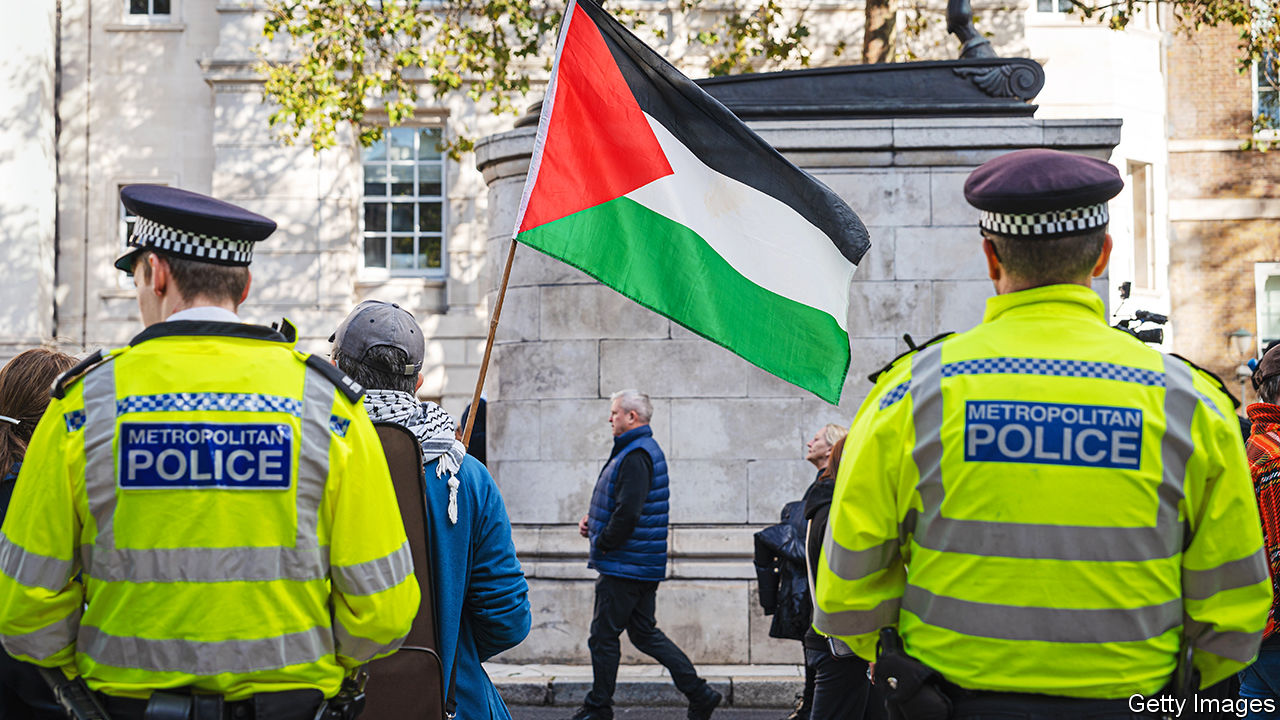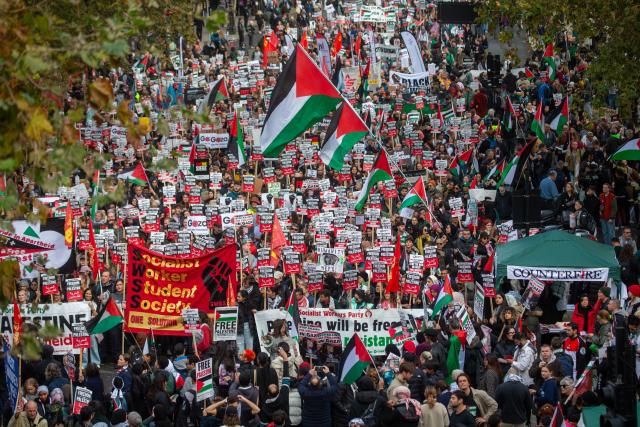Armistice Day Organizers Support Pro-Palestine March Amid Braverman Criticism
Armistice Day organisers support pro-Palestine march amid Braverman criticism. Armistice Day, commemorating the end of World War I on November 11th, 1918, is facing controversy this year as a planned pro-Palestine march in London clashes with traditional remembrance events.
Author:Suleman ShahReviewer:Han JuNov 10, 20237.5K Shares192.9K Views

Armistice Day organizers support pro-Palestine march amid Braverman criticism. Armistice Day, commemorating the end of World War I on November 11th, 1918, is facing controversy this year as a planned pro-Palestine march in London clashes with traditional remembrance events.
The protest has ignited a fierce debate over the right to demonstrate on a day dedicated to honoring war veterans.
Armistice Day, a significant annual commemoration, holds a multifaceted significance that does not preclude the expression of dissent, especially regarding Israel's actions in Gaza.
This day, observed annually on November 11th to mark the ceasefire concluding World War I in 1918, serves as a solemn remembrance for those who have sacrificed their lives in service since 1914.
Additionally, it symbolizes a triumph over adversaries that sought to curtail essential freedoms for Britons, including the right to protest.
Home Secretary's Controversial Stance
Contrary to the spirit of open expression, Suella Braverman, the home secretary, advocates for the cessation of a planned pro-Palestine march in London on November 11th.
Her characterization of it as a "hate march" infused with "thuggish intimidation and extremism" has heightened tensions. Rather than fostering unity, her remarks have, unfortunately, succeeded in sowing division.
Recent calls from far-right instigators to "defend" the Cenotaph, a monument honoring war dead in central London, have further intensified the situation.
Responding to these developments, the Metropolitan Police has urged organizers to consider canceling the march.
Political Back-and-Forth On Pro-Palestine March
Prime Minister Rishi Sunak initially supported the ban on the pro-Palestine march, emphasizing its perceived disrespect for Armistice Day.
However, a U-turn followed after a meeting with Metropolitan Police Commissioner Mark Rowley, where Sunak confirmed the march would proceed but maintained his stance on its alleged disrespect.
Prime Minister Rishi Sunak has given the green light for the scheduled pro-Palestinian march to proceed on Armistice Day in London, despite maintaining his stance that the event is "disrespectful" and has the potential to foster division.
This decision marks a notable shift in Sunak's position, which emerged following a crucial meeting at Downing Street with Metropolitan Police Commissioner Mark Rowley on Wednesday afternoon.
Just hours before this meeting, Sunak had publicly declared his intention to personally "hold Rowley accountable" if the march unfolded and disrupted the official events commemorating the end of World War I.
In the midst of these controversies, calls for an immediate ceasefire in Gaza have surfaced in the House of Commons.
The SNP aims to seek a vote on its King's Speech amendment, urging the government to press for an urgent ceasefire.
The Labour Party has also tabled an amendment seeking an immediate ceasefire in the Israel-Hamas conflict.
Braverman's Accusations Draw Criticism
Suella Braverman's accusations of police bias and attempts to stop the pro-Palestine march have faced severe backlash.
Critics, including Yvette Cooper and various organizations, argue that her remarks are "dangerous" and "deliberately inflaming tensions."
The fallout from Braverman's controversial statements continues, with senior figures from different parties calling for her removal.
Some within the Conservative Party label her as "divisive" and a "liability," while Labour's Jonathan Reynolds explicitly calls for her sacking.
Supreme Court To Rule On Deportation Policy
In a related development, the Supreme Court is set to rule on the legality of the government's plans to deport asylum seekers to Rwanda.
On November 15th, the Home Office will make a decision regarding the contentious policy.
The controversy extends to Scotland, where pro-Palestinian protesters have scaled the Scottish Parliament, displaying banners calling for an end to arming Israel.
This demonstration adds another layer to the ongoing debate surrounding the Israel-Palestine conflict.
Final Words
Braverman's opposition to the pro-Palestine march has sparked a political uproar, fueling the Armistice Day controversy.
The conflict between traditional observances and protest rights highlights the challenges governments face in navigating global issues.
The conflicting government positions call for a ceasefire vote, and the Supreme Court's upcoming decision adds to the complexity.
Braverman's future as Home Secretary is uncertain amid growing criticism and questions about her leadership.

Suleman Shah
Author
Suleman Shah is a researcher and freelance writer. As a researcher, he has worked with MNS University of Agriculture, Multan (Pakistan) and Texas A & M University (USA). He regularly writes science articles and blogs for science news website immersse.com and open access publishers OA Publishing London and Scientific Times. He loves to keep himself updated on scientific developments and convert these developments into everyday language to update the readers about the developments in the scientific era. His primary research focus is Plant sciences, and he contributed to this field by publishing his research in scientific journals and presenting his work at many Conferences.
Shah graduated from the University of Agriculture Faisalabad (Pakistan) and started his professional carrier with Jaffer Agro Services and later with the Agriculture Department of the Government of Pakistan. His research interest compelled and attracted him to proceed with his carrier in Plant sciences research. So, he started his Ph.D. in Soil Science at MNS University of Agriculture Multan (Pakistan). Later, he started working as a visiting scholar with Texas A&M University (USA).
Shah’s experience with big Open Excess publishers like Springers, Frontiers, MDPI, etc., testified to his belief in Open Access as a barrier-removing mechanism between researchers and the readers of their research. Shah believes that Open Access is revolutionizing the publication process and benefitting research in all fields.

Han Ju
Reviewer
Hello! I'm Han Ju, the heart behind World Wide Journals. My life is a unique tapestry woven from the threads of news, spirituality, and science, enriched by melodies from my guitar. Raised amidst tales of the ancient and the arcane, I developed a keen eye for the stories that truly matter. Through my work, I seek to bridge the seen with the unseen, marrying the rigor of science with the depth of spirituality.
Each article at World Wide Journals is a piece of this ongoing quest, blending analysis with personal reflection. Whether exploring quantum frontiers or strumming chords under the stars, my aim is to inspire and provoke thought, inviting you into a world where every discovery is a note in the grand symphony of existence.
Welcome aboard this journey of insight and exploration, where curiosity leads and music guides.
Latest Articles
Popular Articles
